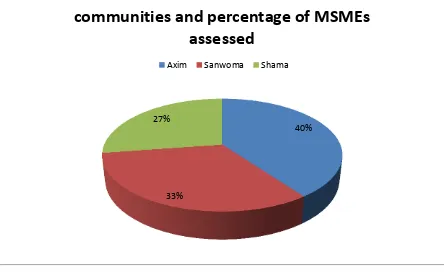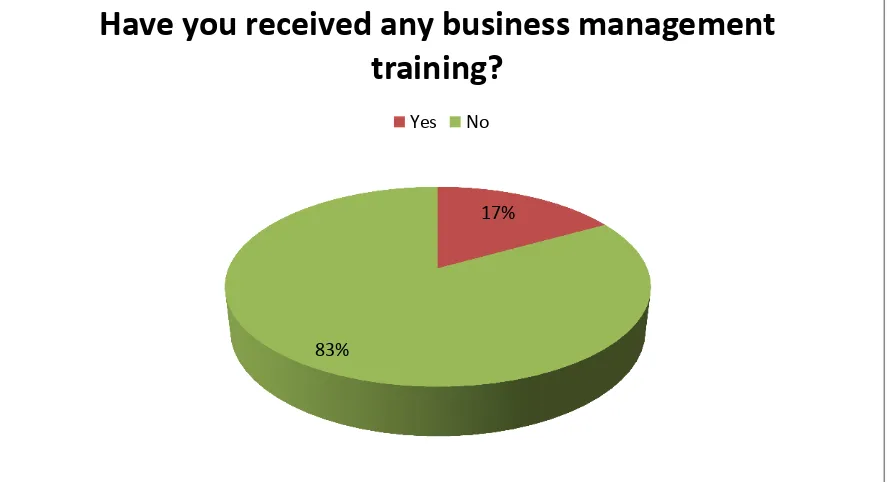SUSTAINABLE FISHERIES
MANAGEMENT PROJECT (SFMP)
Report on MSMEs Training Needs
Assessment for Ankobra and Pra
This publication is available electronically on the Coastal Resources Center’s website at
http://www.crc.uri.edu
For more information on the Ghana Sustainable Fisheries Management Project, contact: USAID/Ghana Sustainable Fisheries Management Project
Coastal Resources Center
Graduate School of Oceanography University of Rhode Island
220 South Ferry Rd.
Narragansett, RI 02882 USA
Tel: 401-874-6224 Fax: 401-874-6920 Email: [email protected]
Citation: Swanzy, S. (2015). Report on MSMEs Training Needs Assessment for Ankobra and Pra Estuaries. The USAID/Ghana Sustainable Fisheries Management Project (SFMP). Narragansett, RI: Coastal Resources Center, Graduate School of Oceanography, University of Rhode Island and Daasgift Quality Foundation. GH2014_ACT030_DQF. 10 pp.
Authority/Disclaimer:
Prepared for USAID/Ghana under Cooperative Agreement (AID-641-A-15-00001) awarded on October 22, 2014 to the University of Rhode Island and entitled; the USAID/Ghana Sustainable Fisheries Management Project (SFMP).
ii
Detailed Partner Contact Information:
USAID/Ghana Sustainable Fisheries Management Project (SFMP) 10 Obodai St., Mempeasem, East Legon, Accra, Ghana
Brian Crawford Chief of Party [email protected]
Najih Lazar Senior Fisheries Advisor [email protected]
Patricia Mensah Communications Officer [email protected]
Bakari Nyari Monitoring and Evaluation Specialist [email protected]
Don Robadue, Jr. Program Manager, CRC [email protected]
Justice Odoi USAID Administrative Officer Representative [email protected]
Kofi.Agbogah
SNV Netherlands Development Oganization #161, 10 Maseru Road,
E. Legon, Accra, Ghana 233 30 701 2440
Donkris Mevuta Kyei Yamoah
[email protected] Friends of the Nation Parks and Gardens Adiembra-Sekondi, Ghana 233 312 046 180
Peter Owusu Donkor Spatial Solutions
[email protected] #3 Third Nautical Close,
Nungua, Accra, Ghana 233 020 463 4488
Thomas Buck
SSG Advisors 182 Main Street
Burlington, VT 05401 (802) 735-1162
Victoria C. Koomson
[email protected] CEWEFIA
B342 Bronyibima Estate Elmina, Ghana
233 024 427 8377
Lydia Sasu
Darkuman Junction, Kaneshie Odokor Highway
Accra, Ghana 233 302 315894
Gifty Asmah
[email protected] Daasgift Quality Foundation
Headmaster residence, Sekondi College Sekondi, Western Region, Ghana 233 243 326 178
For additional information on partner activities:
CRC/URI: http://www.crc.uri.edu
CEWEFIA: http://cewefia.weebly.com/
DAA: http://womenthrive.org/development-action-association-daa Daasgift:
https://www.facebook.com/pages/Daasgift-Quality-Foundation-FNGO/135372649846101 Friends of the Nation: http://www.fonghana.org Hen Mpoano: http://www.henmpoano.org
SNV: http://www.snvworld.org/en/countries/ghana SSG Advisors: http://ssg-advisors.com/
ACRONYMS
CEDECOM Central Region Development Commission
CEWEFIA Central and Western Region Fishmongers Improvement Association CLaT Child Labour and Trafficking
DAA Development Action Association DSW Department of Social Welfare FoN Friends of Nation
SFMP Sustainable Fisheries Management Program SNV Netherlands Development Organization
USAID United States Agency for International Development WFCL Worst Forms of Child Labour
TABLE OF CONTENTS
Acronyms ... ii
Introduction ...1
Purpose ...1
Methodology ...1
Conclusion ...6
LIST OF TABLES
Table 1 Number of MSMEs in Communities ...1LIST OF FIGURES
Figure 1 Communities and Percentage of MSMEs Assessed ...2Figure 2 Questionnaire Response 1 ...3
Figure 3 Questionnaire Response 2 ...4
Figure 4 Questionnaire Response 3 ...5
1
INTRODUCTION
As part of activities under IR 4.8.2, Four hundred (400) MSMEs were identified and
screened. Out of the four hundred, two hundred (200) MSMEs were selected and registered to be trained. With an objective to provide an effective tailor made training program for the selected MSMEs, a training needs assessment tool (TNA) was conducted to their training needs.
PURPOSE
The purpose for the Training Needs Assessment was to identify and list the training needs of selected MSMEs in all the three coastal communities; Shama, Axim, Sanwoma. This exercise was carried out on 1st, 7th and 8th of July, 2015.
METHODOLOGY
In order to identify the training needs of MSMEs, a Training Needs Assessment Tool was developed and used to assess the knowledge of MSMEs on financial literacy, health, safety and environment, marketing and customer care, pricing and record keeping. The table below shows the number of MSMEs assessed per each community. In all one hundred and ninety out of the two hundred selected MSMEs were interviewed.
Table 1 Number of MSMEs in Communities
Community Number of MSMEs Assessed Percentage
Axim 76 40
Sanwoma 62 33
Shama 52 27
Figure 1 Communities and Percentage of MSMEs Assessed
Source: TNA Assessment date, 2015
From Figure 1:
76 out of 190 (40%) respondents represented Axim 62 out 190 (33%) represented Sanwoma
52 out of 190 (27%) represented Shama
40%
33% 27%
communities and percentage of MSMEs
assessed
3
Figure 2 Questionnaire Response 1
Source: TNA Assessment data, 2015
From Figure 2:
32 out of 190 (17%) respondents stated they had received some business management training
158 out of 190 (83%) stated they had not received any business management training
17%
83%
Have you received any business management
training?
Figure 3 Questionnaire Response 2
Source: TNA Assessment data, 2015
From Figure 3:
171 out of 190 respondents (90%) stated they would like to be trained 19 out of 190 (10%) stated they would not like to be trained.
90% 10%
would you like to be trained?
5
Figure 4 Questionnaire Response 3
Source: TNA Assessment data, 2015
From Figure 4:
23 out of 190 (12%) responded they would want financial literacy / management training 81 out 190 (43%) responded they would want business management training
47 out of 190 (25%) responded they would want training on packaging / storage and branding 12 out of 190 (6%) responded they would want training on profit making
20 out 190 (10%) responded they would want training on record keeping
7 out 190 (4%) responded they would want training on marketing / customer service
financial Costing, Sales and
Profit margin
Figure 5 Questionnaire Response 4
Source: TNA Assessment data, 2015
From Figure 5:
159 out of 190 (84%) responded they have no knowledge on health safety and environment 31 out 190 (16%) responded they have some knowledge on health safety and environment
CONCLUSION
From the analyses above, it is clearly established that MSMEs need the following training skills to improve their businesses:
1. Business management training 43%,
2. Packaging/Storage and branding training 25% 3. Financial literacy/management training 12% 4. Records keeping training 10%,
5. Costing, Sales and Profit margin computation 6%. 6. Marketing/customer care 4%
no knowledge 84% some knowledge
16%




